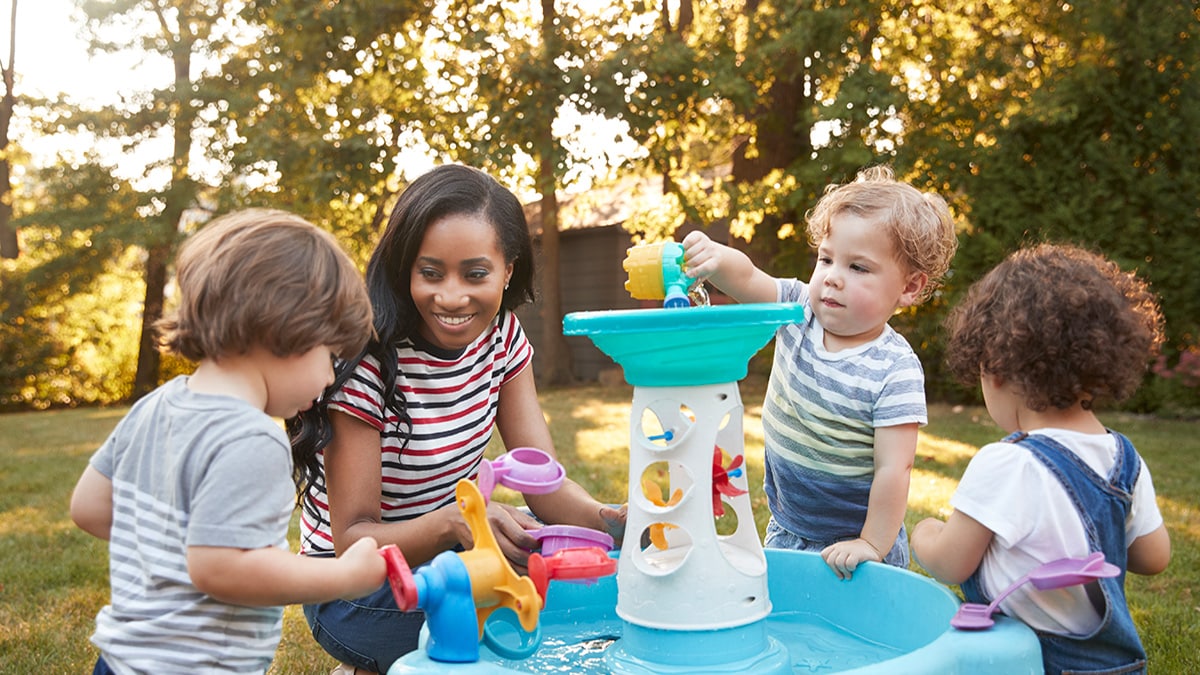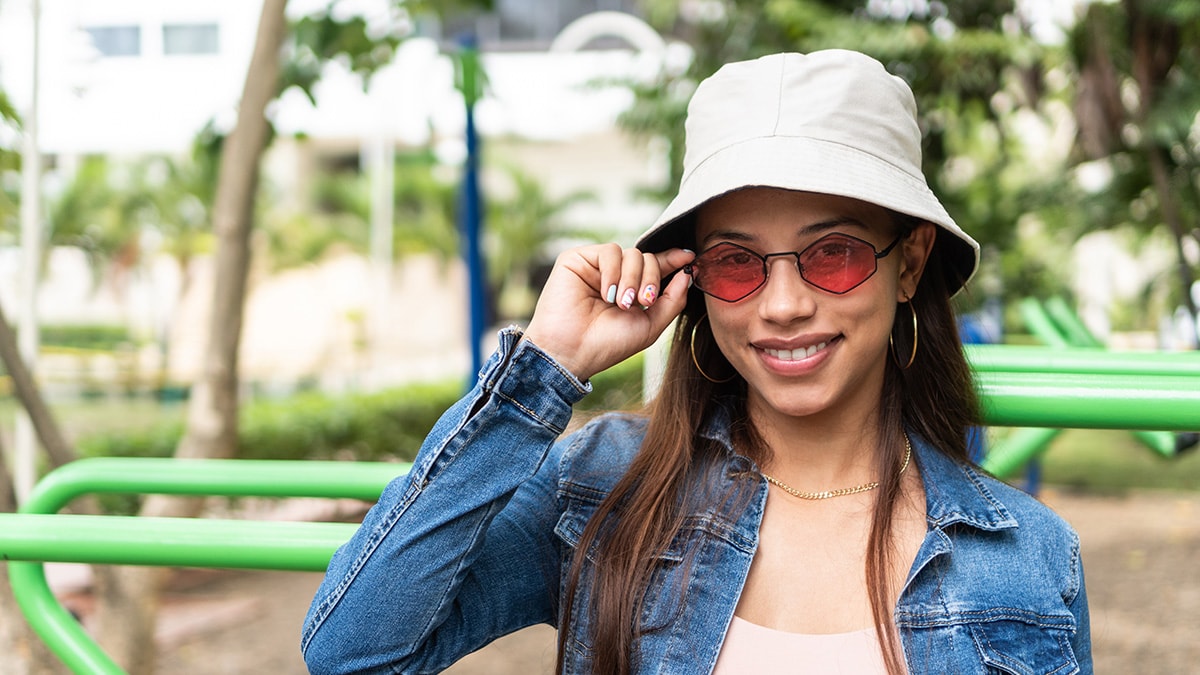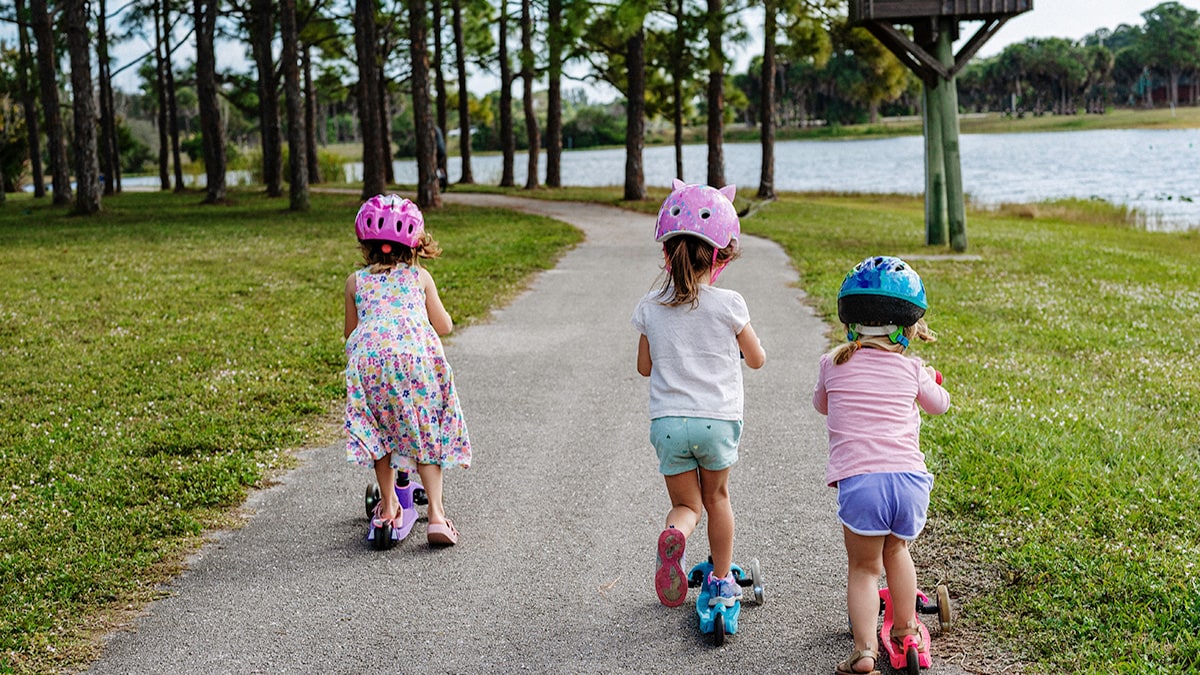At a glance
Outdoor play in early care and education (ECE) programs can have many benefits for children’s healthy development, but spending time outside also comes with risks of illness and injury. ECE providers can help keep children safe while they learn and stay active outside.

Benefits of outdoor play in ECE settings
Healthy bodies
Outdoor play is a great way to get children to move and stay physically active, which protects their health in childhood and throughout life. For ECE programs, going outside can mean having more space to jump, run, climb, and have fun. Children learn through free play and need opportunities to take risks, test their limits, and learn new skills. Being physically active by playing outdoors and in nature can help children develop strong bodies and meet important developmental milestones for movement and physical development. Time spent in bright sunlight can also reduce nearsightedness.
Healthy minds
Moving and staying active are important for having a healthy brain. Playing and exploring the outdoors can give children new experiences. When the weather is not too cold or too hot, ECE programs can take children to the playground or on walks to look at new sights and experience new sounds. Being outdoors often enables children to try different games and practice skills that help them meet milestones in learning, language, and emotions. Studies show that time spent playing outside can help children by improving their grades, attention spans, and behavior.
Ways to keep children safe and healthy
Protect children from sun and heat
Sunburns can happen even on cloudy or cool days. To protect their skin, keep children in the shade and encourage wearing wide-brimmed hats, sunglasses, and clothes that cover children's arms and legs. With parental permission, for children older than 6 months, use sunscreen with an SPF of 15 or higher on any exposed skin:
- Apply sunscreen 30 minutes prior to outside play to allow the sunscreen to absorb into the skin.
- Reapply at least every 2 hours or more often if children are sweating or spending time in the water.
Sunscreen is not recommended for babies who are 6 months old or younger. Keep younger babies who cannot use sunscreen out of direct sunlight by finding shade and dressing them in sun-protective clothing.
Children often rely on caregivers to keep them cool and hydrated when it's hot outside:
- Dress children in lightweight, loose-fitting clothing to help keep them from overheating when it's hot.
- Check to make sure the children are drinking plenty of fluids such as water to keep them cool and hydrated. Avoid really cold drinks or drinks with a lot of sugar.
- Use CDC's HeatRisk Dashboard to plan outdoor play, including the HeatRisk Forecast Tool, details on local air quality, and actions to stay safe on hot days or days with poor air quality.
- For children and ECE providers who may be particularly sensitive to heat including children with asthma, pregnant women, or people with cardiovascular disease: Talk to a healthcare provider about using the CDC clinical guidance to create personalized plans that will help ensure everyone can continue to safely enjoy warmer months.

Some of the same strategies that help prevent sunburn can also help keep children cool:
- Keep children in the shade when possible to help prevent overheating.
- On hot days, try to avoid scheduling outdoor activities from late morning to midafternoon, when the sun is the strongest.
- Provide breaks during outdoor activities to reapply sunscreen and get water.
- Be aware of the symptoms of heat-related illness.
Protect children from bug bites
Outdoor activities can increase the risk of bug bites. Bugs, including mosquitoes, ticks, fleas, and flies, can spread germs. With parental permission, using insect repellent registered by the Environmental Protection Agency (EPA) can help protect children from bug bites:
- Find the right insect repellent by using the EPA's search tool.
- Always follow label instructions.
- Apply the insect repellent to your hands first and only use enough to cover the child's exposed skin.
- Do not apply insect repellent to children's hands, eyes, or mouth or to cuts or irritated skin.
- Wash your hands immediately after.
- Apply insect repellent after applying sunscreen.
EPA-registered insect repellents are proven safe and effective when used as directed. Do not use products containing oil of lemon eucalyptus (OLE) or para-menthane-diol (PMD) on children younger than 3 years.
Encourage parents to dress children in clothing that covers their arms and legs when planning to be outside, and cover strollers and baby carriers with mosquito netting. Be aware of ticks in areas where they might be present, such as tall grasses and brush and check clothing and gear for ticks frequently.
Protect children from injuries outdoors
Playgrounds are great places for children to play and explore risks and limits, but they can also put children at risk for injuries. On the playground, using certain types of equipment such as monkey bars, climbing equipment, and swings is more likely to lead to concussions and other brain injuries.

For a safe and fun playground experience, seek out playgrounds with
- Equipment that is right for the child's age.
- Soft material below equipment, such as wood chips, sand, or mulch.
- Guardrails to help prevent falls.
Look out for things in the play area that can trip the children, such as tree stumps or rocks.
If outdoor play includes riding tricycles or bicycles or using rollerblades, skateboards, or similar wheeled equipment, be sure that children use well-fitting helmets.
While playing outdoors, children may see stray or wild animals. Keep children away from snakes, rodents, and other animal hazards.
Water play: Protect children from germs
Water activities are a fun way to stay cool in the summer. Before engaging in water activities, it's important to understand how to avoid recreational water-related injuries and illnesses.
Water play is fun but can spread germs that can make children very ill. Take steps to prevent swimming-related illnesses. Pools and water playgrounds with appropriate chemical levels are less likely to spread germs.
- Make sure that fences fully enclose pools to protect children from accidentally falling into the water.
- Make sure anyone sick with diarrhea stays out of the water.
- In splash pads, don't let children sit or stand on the jets. This can rinse poop out of diapers or off butts.
- Take children on bathroom breaks and check diapers every hour.
- Keep children from swallowing pool or splash pad water. For example, don't allow children to use toys that could help them drink the water.
- Check that pools and water playground equipment such as splash pads have proper chlorine and bromine levels and appropriate pH, which decrease the likelihood of spreading germs. To prevent pool chemical injuries, make sure all pool chemicals are secured away from children.
Anyone with an open cut or wound, particularly from a surgery or piercing, should use a waterproof bandage to cover the cut or wound or stay out of the water. To prevent the spread of germs, small inflatable or plastic kiddie pools and water slides should NOT be used in the ECE setting.
Water play: Protect children from drowning
Drowning can happen quickly and quietly anywhere there is water. Adults play a key role in protecting children from drowning and other recreational water-related injuries by closely and constantly supervising them:
- Avoid distracting activities such as reading or using a phone while supervising children in or near water.
- Take extra precautions to supervise children who have medical conditions or who might be affected by side effects of medications.
- Ensure that all ECE providers maintain CPR training.
Formal swimming lessons for children can further reduce the risk of drowning.
